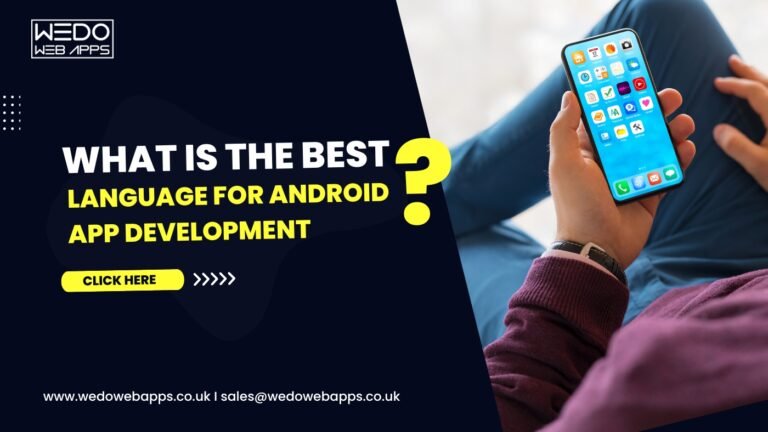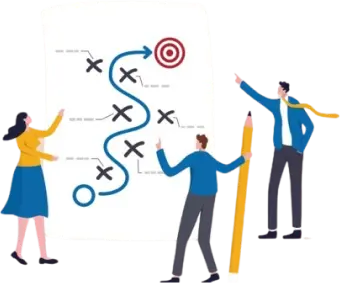3 Sep, 2023 | Mobile App Development
What is the Best Language for Android App Development?

1. Introduction: The Importance of Choosing the Right Language
Before delving into the specifics, it's imperative to understand why the selection of an appropriate programming language is crucial:1.1. Performance
The language you choose can influence the speed and responsiveness of your app. An optimised language can lead to smooth animations and quick response times.1.2. Maintenance
Some languages have extensive libraries and community support, making it easier to update and maintain the app in the long run.1.3. Flexibility
Different languages offer varied levels of flexibility. This can affect the app's features, integrations, and scalability.2. Popular Languages for Android App Development
Let's dive into the best languages for Android development and understand their pros and cons:2.1. Java
Pros: Java is Android's official language, and most of the Android operating system is written in it. It offers vast libraries and has been a stable choice for developers worldwide. Cons: Java might be a bit verbose and can lead to longer development times compared to modern languages.2.2. Kotlin
Pros: Google announced Kotlin as the official language for Android development in 2019. Kotlin is more concise than Java, offers better safety features, and ensures interoperability with Java. Cons: While the learning curve for Java developers is minimal, those unfamiliar with Java might find some Kotlin concepts a tad challenging.2.3. C++
Pros: With the Android Native Development Kit (NDK), developers can use C++ to write parts of their apps. This can be beneficial for performance-intensive apps. Cons: It might be more complex to set up and is generally not recommended for complete app development due to its complexities.3. Factors to Consider While Choosing the Best Language
3.1. Project Requirements
Consider the features, complexity, and performance needs of the app. A simple app might do well with Java, while performance-heavy apps might benefit from C++ components.3.2. Team Expertise
Your development team's expertise plays a pivotal role. A team well-versed in Kotlin might produce better results using it than struggling with a new language.3.3. Long-term Goals
Consider the app's future. If you anticipate significant scaling or updates, it's best to go with languages like Kotlin that offer more modern constructs and ease of maintenance.4. Community and Resources
An active community and abundant resources make it easier to troubleshoot issues, find libraries, and keep the app updated. Both Java and Kotlin have robust communities, given their association with Android.5. Emerging Options in Android Development
While Java and Kotlin dominate the Android app development scene, it's essential to remain updated with emerging languages and frameworks that promise to redefine the landscape.5.1. Dart (with Flutter)
Pros: Dart, especially when used with the Flutter framework, offers a reactive-style approach to UI development, allowing for cross-platform applications from a single codebase. Cons: Dart is still relatively new in the mobile development world, so it might not have the extensive library support or community of older languages.5.2. Python (with Kivy or BeeWare)
Pros: Python, a versatile language, can also be employed for Android development when combined with frameworks like Kivy or BeeWare. Cons: Python is not native to Android, and thus, apps might suffer in terms of performance when compared to those developed with Kotlin or Java.6. The Integration of Modern Technologies
Today's apps are no longer limited to basic functionalities. With the rise of Artificial Intelligence, Augmented Reality, and the Internet of Things (IoT), the language chosen should support the integration of these technologies.6.1. Augmented Reality
For apps that incorporate AR, languages that can seamlessly integrate with AR platforms like ARCore (for Android) are essential.6.2. IoT Integration
Languages that can communicate effortlessly with a wide range of IoT devices might become increasingly important as the IoT landscape expands.7. Developer Tools and Environment
An efficient Integrated Development Environment (IDE) can significantly boost productivity. Android Studio, the official IDE for Android app development, supports both Java and Kotlin. For those leaning towards Dart and Flutter, the Flutter plugin for Android Studio is a boon.8. Looking Ahead: The Future of Android Development
The realm of Android development is vast and constantly evolving. With Google continuing to introduce new tools, libraries, and best practices, the definition of the "best language" will invariably change. As a developer or a business owner, adaptability is the key. While Kotlin and Java are currently reigning, it's wise to keep an eye on emerging languages and paradigms. Find out the best language for Android app development and learn how partnering with a proficient mobile app development agency can make your project a success.Final Words
To circle back to our initial query, "What is the best language for Android app development?" – the answer remains fluid. It depends on individual project requirements, the team's expertise, future scalability, and the app's intended functionalities. What's most crucial is ensuring that whatever language or framework you opt for aligns with your vision and goals for the app. Always prioritize user experience and app performance, as these are paramount in the ever-competitive app market. Choosing the best language for Android app development is crucial, but enhancing your skills with practical guidance is equally important. Check out these mobile app development tutorials for step-by-step instructions.Frequently Asked Questions
Java and Kotlin are currently the leading languages for Android development, with Kotlin being the more modern choice officially supported by Google.
Yes, you can use Python for Android app development with frameworks like Kivy or BeeWare. However, it's worth noting that Python isn't native to Android, so performance may vary compared to Kotlin or Java apps.
"Better" is subjective. Kotlin offers a more concise syntax, enhanced safety features, and is officially recommended by Google. However, Java has been around longer and has extensive library support. The choice often boils down to individual preferences and project requirements.
Dart, especially with the Flutter framework, offers a promising approach to cross-platform app development. It allows developers to write code once and deploy on both Android and iOS. However, as with any cross-platform solution, there might be some limitations compared to native development.
Dart, with the Flutter framework, is gaining traction for cross-platform development. Additionally, as technology evolves, it's always a good idea to keep an eye on the broader development ecosystem for emerging languages and tools.
Integration capabilities can influence language choice. For instance, if developing an app with extensive AR features, the language should support AR platforms like ARCore seamlessly. Similarly, for IoT integration, languages that can communicate effortlessly with a range of devices are preferable.
While Android Studio is the official and most popular IDE for Android development, other environments can be used. However, Android Studio offers the best integration with both Java and Kotlin and has plugins available for other languages and frameworks like Flutter.
Technology, especially in the mobile app realm, evolves rapidly. It's advisable to periodically review the latest tools, languages, and best practices – not just when starting a new project but also to ensure ongoing projects remain updated and efficient.

